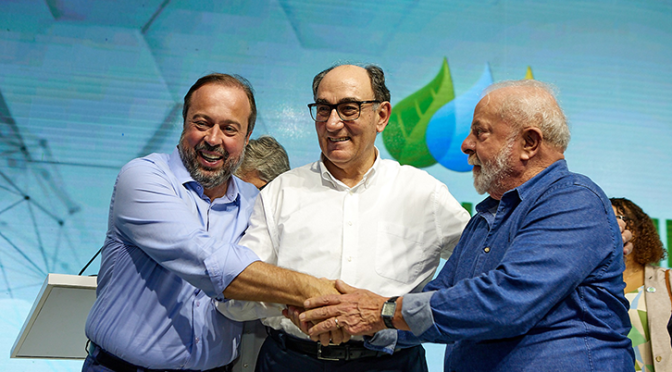The Chairman of Iberdrola, Ignacio Galán, today assured the President of Brazil, Luiz Inácio Lula da Silva, that Iberdrola will be a loyal ally in the country’s energy transition. This was expressed during their visit to the company’s first hybrid complex in Brazil. Located in the interior of Paraíba, in the northeast of the country, the Neoenergia Renewable Energy Complex integrates for the first time the generation of wind and solar energy in this country, thanks to the Chafariz wind farm and the Luzia photovoltaic plant. The complex has involved an investment of 630 million euros and will supply clean energy to 1.3 million homes.
The Neonergía Renewable Complex has a capacity of 600 MW, which will prevent the emission of more than 100,000 tons of CO2 per year. The complex consists of 15 wind farms with a total of 136 wind turbines – with an installed capacity of 471.2 MW – and two solar plants of Neoenergia Luzia, with 228,000 panels and an installed capacity of 149.2 MWp. Connection to the grid is guaranteed by the substation and the transmission line, with an extension of 345 kilometers.
A pioneer in the country, the project stands out for the synergy between wind and solar farms, thus reinforcing Iberdrola’s commitment to the development of the Brazilian energy sector in an innovative, efficient and sustainable manner. Hybridization allows for more efficient management of the two renewable sources, cost reduction and better use of the full potential, including the transmission system.
“Making projects like this a reality requires political leadership capable of establishing long-term planning, a clear energy policy and stable and encouraging regulation,” said Ignacio Galán, chairman of Iberdrola.
“We started in Brazil 20 years ago and today we are more than one hundred companies operating in all segments of the Brazilian electricity sector and serving almost 40 million people with a total of 16,000 employees. Iberdrola and Neoenergia will continue to be loyal allies of Brazil”, said Galán.
For this reason, the electricity company’s chairman has pledged to invest 30 billion reais – some 5.3 billion euros – over the next three years in the country, to continue developing new renewable and grid projects, as well as to make the most of the opportunities offered by technologies such as offshore wind power and green hydrogen.
A project with great social impact in Brazil
The Neoenergia Renewable Complex has also generated socioeconomic benefits for the region: more than 680 hours of training classes were given, in which around 180 people were trained as masons, carpenters and blacksmiths. A further 150 people were also trained in the assembly of metal structures for solar panels. These initiatives expand opportunities for residents to enter the labor market. Of the more than 3,600 direct and indirect jobs that have been created, 40% have been filled by local workers.
The Complex covers an area of 8,700 hectares, of which only 14% is occupied, in the municipalities of Santa Luiza, Areia de Baraúnas, São Jose de Sabugi and São Mamede, in the state of Paraíba.
Neoenergía, Iberdrola’s subsidiary in Brazil
The subsidiary of the Spanish group has been operating in Brazil since 1997 and is currently one of the leaders in the country’s electricity sector. Its businesses are divided into the areas of generation, transmission, distribution and commercialization. Its distributors serve more than 16 million customers, equivalent to a population of more than 37 million people.
Neoenergia has 5.1 GW of installed generation capacity, 90% of which is renewable, and is implementing another 200 MW with the construction of new wind farms. In the network business, it has 2,500 km of lines in operation and 6,100 km under construction.
Through the Neoenergia Institute, it promotes sustainable development based on socio-environmental actions and thus contributes to improving the quality of life of the communities where the company operates, especially of the most vulnerable people, always aiming at sustainable development.


